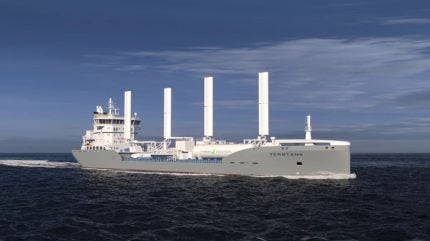
Kongsberg Maritime will design and equip another hybrid-propulsion chemical tanker for Tärntank after signing its eleventh contract with the Danish company.
The Kongsberg subsidiary will provide an array of equipment for the wind-assisted vessel, one of five to use wind power under the wider set of deals with Tärntank, to compliment the operator’s own battery-powered hybrid propulsion technology.
The series of 15,000 dwt vessels have been designed with sustainability in mind, with Kongsberg predicting its Promas propulsion system will provide 6% in fuel savings, while the wind-assist technology will cut emissions by 19%.
Tärntank CEO Claes Möller said: “This combination of a good design and innovative systems installed to a newbuild vessel will reduce the carbon footprint of maritime operations beyond the regulatory requirements.”
China Merchants Jingling Shipyard in Yangzhou, China is building all of the tankers ordered by Tärntank and is expected to deliver the five wind-assisted vessels between 2025 and 2027.
The design, which won a Nor-Shipping Next Generation Ship Award in 2023, is part of Kongsberg Maritime’s growing interest in sustainable ship technologies and allows for the tankers to run on diesel, biofuel, or methanol.
Rune Ekornesvåg, Kongsberg Maritime’s sales director for Ship Design, said: “As companies such as Tärntank pursue environmentally efficient shipping, we are committed to facilitating this transition.
“Our dedication to innovation, sustainability, and future emissions standards positions us to shape the maritime industry’s future.”
Wind-assisted propulsion technology has become increasingly popular as a way to reduce emissions in the maritime industry in recent years, with companies such as Alfa Laval and Airbus backing the idea with their own products and designs.


